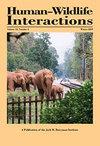密集的狩猎压力改变了野猪在当地的分布
IF 0.9
4区 环境科学与生态学
Q4 BIODIVERSITY CONSERVATION
引用次数: 2
摘要
野猪(Sus scrofa)现在是中欧重要的野生有蹄类动物。除了野猪与农业的冲突之外,野猪存在的主要威胁在于非洲猪瘟在欧洲的蔓延。野猪的高繁殖率和聪明的行为限制了狩猎的有效性,这使得对野猪种群的调节变得复杂。本文分析了野猪在缺乏天然食物资源环境下的空间行为。研究区由一个森林复合体(1283公顷)组成,分为2个区域。在“风险”区,野猪被密集狩猎,而在“避难”区,狩猎压力要小得多。野猪在研究区内分布不规律。保护区野猪密度明显高于危险区。即使在食物短缺的时候,野猪也会避开那些获得高质量食物的地区,因为那里有被杀死的高风险。这一结论适用于冬季和夏季在庄稼地里可以使野猪充分增肥的环境。因此,要有效控制野猪种群数量,必须在大范围内组织均匀的狩猎压力协调。本文章由计算机程序翻译,如有差异,请以英文原文为准。
Intensive Hunting Pressure Changes Local Distribution of Wild Boar
Wild boar (Sus scrofa) is now an important species of wild ungulates in Central Europe. Next to conflicts of wild boar with agriculture, the main threat of wild boar presence lies in the expansion of African swine fever across Europe. The regulation of the wild boar population is complicated by the high reproduction rate and intelligent behavior of the species, which limits hunting effectiveness. We analyzed the spatial behavior of wild boar in an environment with a lack of natural food resources. The study area consisted of a forest complex (1,283 ha) with 2 areas. In the “risk” area, wild boar were intensively hunted, and in the “refuge” area, the hunting pressure was much lower. The distribution of wild boar was not regular within the study area. The wild boar density was higher in the refuge area than in the risk area. Even in times of food shortage, wild boar avoided the area where obtaining quality food was associated with a high risk of being killed. The conclusion applies to the winter season and an environment where the wild boar can become sufficiently fattened in the crop fields in the summer. For effective control of wild boar populations, it is therefore essential to organize the coordination of hunting pressure evenly in large areas.
求助全文
通过发布文献求助,成功后即可免费获取论文全文。
去求助
来源期刊

Human–Wildlife Interactions
Environmental Science-Nature and Landscape Conservation
CiteScore
2.80
自引率
0.00%
发文量
0
审稿时长
11 weeks
期刊介绍:
Human–Wildlife Interactions (HWI) serves the professional needs of the wildlife biologist and manager in the arena of human–wildlife conflicts/interactions, wildlife damage management, and contemporary wildlife management. The intent of HWI is to publish original contributions on all aspects of contemporary wildlife management and human–wildlife interactions with an emphasis on scientific research and management case studies that identify and report innovative conservation strategies, technologies, tools, and partnerships that can enhance human–wildlife interactions by mitigating human–wildlife conflicts through direct and indirect management of wildlife and increased stakeholder engagement. Our intent is to promote a dialogue among wildlife professionals concerning contemporary management issues. As such, we hope to provide a repository for wildlife management science and case studies that document and share manager experiences and lessons learned.
 求助内容:
求助内容: 应助结果提醒方式:
应助结果提醒方式:


